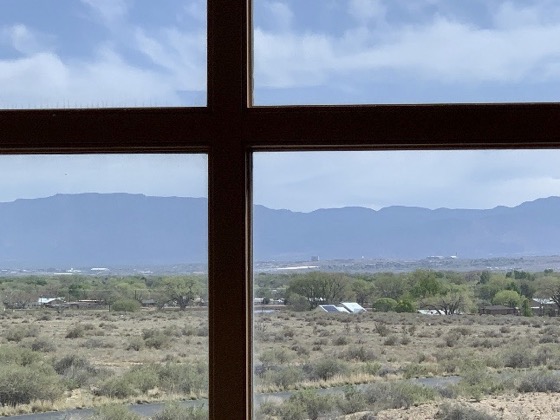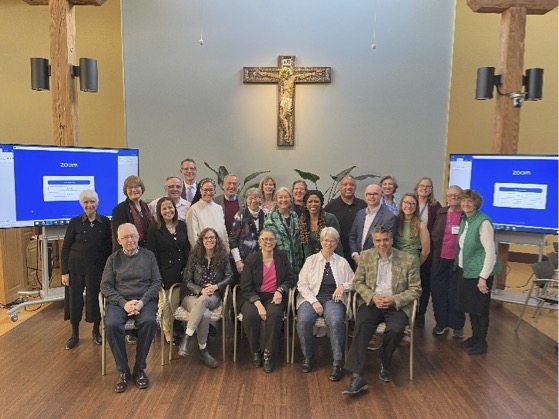29 May 2023
War is a Sacrilege, Let’s Stop Feeding It
Podcast: Play in new window | Download
(Photo by Greg Heille, East to Albuquerque)
There are some places I return to again and again. Here I am today, once again in New Mexico, at Santa Maria de la Vid Abbey—home to a young, growing, culturally diverse community of Norbertine priests and brothers offering hospitality from an architecturally exquisite cluster of monastery buildings looking out on the high desert over Albuquerque’s South Valley.
I am preaching today from the Abbey Church’s eucharistic chapel, where I can look east through a large window to the valley below, with the city of Albuquerque against the distant backdrop of the Sandia Mountains under a stunningly blue New Mexico sky. I can see why New Mexico calls itself the Land of Enchantment.
As an annual visitor to New Mexico, I have come to experience this Pueblo land of the American Southwest as holy ground. I keep returning to receive this desert people’s hospitality and drink from the underground streams of faith and action that sustain the intentional disciples who make a Living Church in this place. Over some four centuries, living faith has sunk deep cultural roots here, and I can imagine Our Lady of Guadalupe’s loving gaze looking out over New Mexico and seeing the City of God here. Wherever you are listening to this preaching, I trust that you, too, can imagine how Mary sees and prays over the City of God in your beloved part of the world.
So here’s the problem.
As I look east out over Albuquerque’s South Valley, I often see airplanes approaching or leaving New Mexico’s international airport in the distance. Only yesterday, I learned that less than two miles south of the airport, at Kirtland Airforce Base, lies an underground storage bunker with 2,500 nuclear warheads. Last year, Archbishop John Wester wrote a pastoral letter, which you can read online, titled “Living in the Light of Christ’s Peace: A Conversation toward Nuclear Disarmament.” He wrote, “If New Mexico were a separate country, it would be the third largest nuclear weapons power in the world.” The pastoral letter reports,
New Mexico hosts two of the nation’s three nuclear weapons laboratories, the Los Alamos and Sandia National Laboratories. During World War II, much of the land for the Los Alamos Lab was seized from Native American ancestral lands and Hispanic homesteaders without adequate compensation, continuing the legacy of colonialism, racism, and systemic violence.
The Los Alamos National Laboratory was the birthplace of nuclear weapons, designing and producing the atomic bombs that destroyed Hiroshima and Nagasaki.
Those two atomic bombs, named Fat Man and Little Boy, killed over 200,000 people, mostly noncombatants.
Today the United States celebrates Memorial Day, a national holiday on which we honor the men and women who have given their lives for their country in military service. I remember my great uncle Carl who died in World War I in France on October 26, 1918, at the age of 26, and I pray for my college roommate Stephen, who died in Vietnam on November 2, 1969, at age 21. But here, as I look east out over the City of God that is Albuquerque, with all its good people and with the largest nuclear stockpile on Earth, I remember all the war dead. How can we rightly commemorate the hundreds and thousands and millions of soldiers and noncombatant children, women, and men sacrificed on the altar of War? One hundred and eight million twentieth-century war dead, and each day now the mounting numbers of war dead in Sudan, Myanmar, Ukraine, and Russia. Our world and ourselves are naive if we have been seduced to believe that war and stockpiling for war is anything but a one-way ticket to hell.
Pope Francis, in a statement a year ago from the Vatican, wrote, “War is madness, war is a monster, war is a cancer that feeds on itself, engulfing everything!” A year earlier, in a 2019 Address at the Peace Memorial in Hiroshima, Francis stated:
With deep conviction I wish once more to declare that the use of atomic energy for purposes of war is today, more than ever, a crime not only against the dignity of human beings but against any possible future for our common home. The use of atomic energy for purposes of war is immoral, just as the possessing of nuclear weapons is immoral. … We will be judged on this. … How can we speak of peace even as we build terrifying new weapons of war? How can we speak about peace even as we justify illegitimate actions by speeches filled with discrimination and hate?
Pope Francis insists, “War is a sacrilege. Let’s stop feeding it!”
Pope Francis repeatedly has said that dialogue is the bridge to justice and peace. Dialogue points and prepares the way to justice and peace. Only in dialogue, and never in war, can we hope to fulfill the demanding but insistent Gospel mandate to love our enemies. We can resist the diabolic seduction of war and turn our intention toward authentic dialogue with our global neighbors and enemies. Imagining ourselves in the prayerful gaze of Mary, we people of faith can look beyond the bunkers of war that divide us to the City of God that is in front of us if we only see it and then help our world makes its way toward it through dialogue.
In today’s responsorial psalm for the Memorial of the Blessed Virgin Mary, Mother of the Church, the psalmist no longer sees enemies but the City of God. Today’s psalmist of Zion, the City of God, inspires us through a movement of the Holy Spirit to build bridges of dialogue, seek justice, and love our global neighbors in our common home. Psalm 87 reads:
Psalm 87 (NRSV), The Joy of Living in Zion
1 On the holy mount stands the city he founded;
2 the LORD loves the gates of Zion
more than all the dwellings of Jacob.
3 Glorious things are spoken of you,
O city of God.
4 Among those who know me I mention Rahab and Babylon;
Philistia, too, and Tyre, with Cush—
“This one was born there,” they say.
5 And of Zion it shall be said,
“This one and that one were born in it,”
for the Most High himself will establish it.
6 The LORD records, as he registers the peoples,
“This one was born there.”
7 Singers and dancers alike say, “All my springs are in you.”
Scripture passage from the New Revised Standard Version Bible: Catholic Edition, copyright 1989, 1993, Division of Christian Education of the National Council of the Churches of Christ in the United States of America. Used by permission. All rights reserved.



30 May 2023 @ 1:40 am
Thank you Fr. Greg for courageous preaching. Much needed wise words at such a time like this! Peace and grace.
30 May 2023 @ 2:03 am
Thank you so much Fr. Gregory for this profound and deeply moving reflection on the need to cease war and stockpiling of nuclear warheads. As a Dominican Sister of Peace for 60 years, I pray with you to God that we may hear this message and seek dialogue and peace in all our interactions with one another. At Eucharist today, our sisters will pray for peace and love for our enemies that all wars may cease and for deescalation of war heads. I, too, lived in Albuquerque, NM where we had a retreat house and is now owned by the Norbertines and I loved gazing our over the “City of God”.
Blessings on your speaking the truth that will set us free,
Brigid Cannon, OP
30 May 2023 @ 2:07 am
I was very moved by your preaching today, Greg. Having lost a 19 yr. old brother in WW II, on Saipan with the Marines, I certainly see war as the monster Pope Francis calls it. May we all
work to find ways to stop feeding it. Thanks for your eloquent reminder. Beth
30 May 2023 @ 2:23 am
Inspired words from your lips to our President’s ears. From another reading this morning: “The church is impoverished whenever we fail to use the gifts we have been given. At Pentecost, each disciple was marked with his or her individual flame. If the gospel is to spread to the ends of the Earth, we must each fund our particular fire and use it.” God bless your flame.
30 May 2023 @ 7:09 am
Hi
Greg, thanks for your comments about our Abbey, Thanks also for a well stated and faith filled perspective on the evil of war.
30 May 2023 @ 8:22 am
Greg, Such a powerful preaching. May your days in the City of God be full of blessings and deep peace. Yesterday morning we sent off the OP Youth Preachers – such possibilities among them. I understand you participated. Sorry I missed seeing you.
31 May 2023 @ 12:24 am
Powerful words that ring true. Not just today, but through the ages. Sadly, we have improved our war tactics and still innocent, women and children die. It is time to have every pulpit speak this truth. Thank you for your words. As an unwilling veteran I find hope.
31 May 2023 @ 7:37 am
Thank you Fr Greg for this powerful reflection . When you quoted Pope Francis, “War is a sacrilege. Let’s stop feeding it”, I hoped that Pope Francis and you had added stop feeding it with our children entering the military, and stop feeding it with our money, our taxes which now comprise more than 1/2 of the federal discretionary budget. We must end our complicity with war.
NO CHILDREN — NO MONEY.
31 May 2023 @ 9:39 am
Thanks, Greg. I have made many beautiful retreats in the hermitages at Santa Maria de la Vid Abbey, loved liturgy and prayer with the community there, but did not know about the storage of nuclear warheads. My sister lives in Albuquerque, and it was easy to go for a home visit and plan retreat time with the Norbertines (Premonstratension, yes?). How marvelous that you preach there. Chabanel
11 June 2023 @ 7:12 am
Powerful, Greg! Would that there were more like Pope Francis, Archbishop Wester, and YOU to denounce WAR more courageously. Nuclear weapons in particular are probably the greatest threat to humanity. Let’s support everything and everyone who work for disarmament, like ICAN –the International Campaign to Abolish Nuclear Weapons. (www.icanw.org).